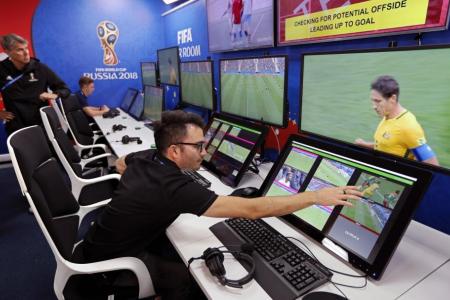An inVARiable effort towards perfection
The Video Assistant Ref (VAR) may also have its flaws, but is another step towards eradicating errors
Forewarned is traditionally forearmed, but not necessarily where VAR (video assistant referee) is concerned.
Those in Russia with a firm knowledge of the new system, which is making its World Cup debut, can attest to its mixed success.
The Australian league was the first domestic league to trial the technology last year, but have still fallen afoul of its flaws after the only goal in May's A-League Grand Final should have been disallowed for offside.
The English Premier League railed against the implementation of VAR for another 12 months at least after the error-strewing rolling out during the FA Cup overshadowed a number of high-profile ties involving Manchester United, Chelsea, Tottenham and Liverpool.
Backlash to the VAR has also emanated from within Europe's top five leagues, with 47 per cent of Bundesliga players surveyed by magazine Kicker already in favour of eliminating it after barely a half-season.
It is easy to see why, after a retrospective penalty for Mainz in their relegation battle with Freiburg was awarded while the players were in the dressing rooms for half-time.
Portugal have also discovered the drawbacks of relying on technology in their top flight after a giant Boavista flag obscured an offside goal in their side's 3-0 defeat to Aves.
VAR remains by no means a flawless process, but its past high-profile failings only serve to enhance its role in helping produce a successful World Cup that is ultimately fair and equal.
For instance, Spain could have benefited from its introduction far sooner, with Nigel de Jong's kung-fu kick on Xabi Alonso in the 2010 final going down as a great disciplinary injustice – one which even referee Howard Webb wished he had upgraded to a sending-off offence.
Stripping away the margins of error which made the World Cup, as well as other games and tournaments, so memorable will be considered a death knell to football's romanticism.
Goal-line technology and VAR ensure that moments like Geoff Hurst's crucial second goal for England in 1966 and Diego Maradona's "Hand of God" moment will remain frozen in time; unlikely to ever be repeated.
Nostalgia sees the game painted in a more favourable light than its modern incarnation.
Everything was considered more ideological in the past, but it was hardly perfect.
It is why four men in a Moscow control room will attempt to put the world to rights this summer.
Get The New Paper on your phone with the free TNP app. Download from the Apple App Store or Google Play Store now



